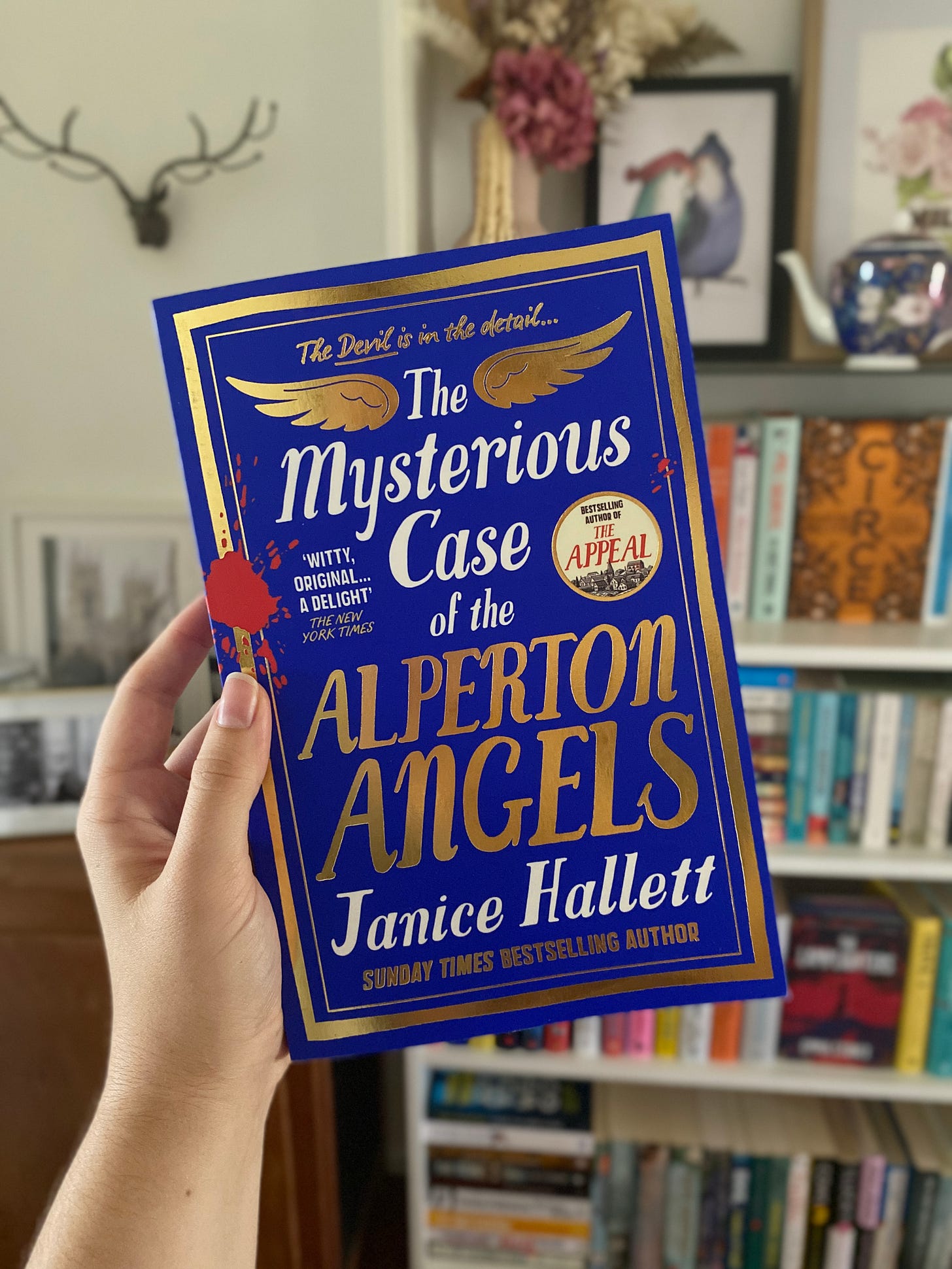Chapter 4: The Mysterious Case of the Alperton Angels by Janice Hallett
A clever 'found documents' thriller about the influence of cults and true crime that will keep you hooked.
I can still remember the seductive thrill of reading The Appeal. Janice Hallett’s debut novel was presented as a collection of evidence documents in a truly unique murder mystery. I finished it in about a day, enthralled by the story and in awe of its presentation.
This style has become Hallett’s signature, and The Mysterious Case of the Alperton Angels took me right back to that day I spent curled up on the couch with The Appeal.
Hallett’s third novel is again told through a dossier of documents – this time, found in a safety deposit box. It’s up to us, the reader, to decide what to do with everything that’s contained in the folder: do we take it to the police or forget it ever existed?
It’s difficult to discuss Hallett’s novels without spoilers, but I’ll do my best. Although if, like me, you prefer going in with no idea at all, then it might be best to pause here and return later…
At the heart of this story are two journalists racing each other to dig up juicy new details about a historic cult murder pact. Let me give you the rundown.
The Alperton Angels were convinced there was an anti-Christ amongst them: the baby of one of their members. Their divine mission was to kill it, but on the night of the planned sacrifice, the mother, Holly called the police. Mother and baby disappeared into the care system, and police uncovered the bodies of the Angels after what appeared to be a suicide pact. The surviving cult leader was sentenced to jail time.
Eighteen years later, journalist Amanda is signed to write an exclusive book with the as-yet-untold story of the baby who was saved that night. But then she finds out her former colleague (and old rival) Oliver is signed on with another publisher chasing the same story.
The Mysterious Case of the Alperton Angels shares their research and their slowly dawning realisation that everything we know of the case may have been wrong.
As a journalist myself, I was hooked from the get-go. The way a story gets under your skin and the drive to find more, it all felt so real (and close to home). Admittedly, Amanda employs different methods to me and is a little abrasive – yet this does make for a great character in a novel. Her interviews are transcribed by Ellie, whose small, often empathetic, asides were a lovely addition.
Interestingly, there are dedications book-ending the story. The closing dedication is the reason I gave a slight spoiler warning up there. Because this book is dedicated to Michelle McNamara, Lyra McKee and Jill Dando – three journalists “who all, tragically, became the story”.
Hallett also cites McNamara’s I’ll Be Gone in the Dark as the spark for this novel. For me, too, that book was inspirational and one of the things that spurred me to write a true crime podcast exploring a serial killer in my hometown. I’ve been itching to re-read it for a while and this novel only intensified that feeling – despite confronting subject matter, it is a remarkable investigation and hints at the immense writing talent we lost with McNamara’s death.
These things, of course, piqued my interest and made me love this novel even more. But if you’re just here for a thrilling, can’t-put-it-down crime read? Yep, this is for you. Admittedly, the story itself unfolds slowly. But I was so swept up in the story and the swift pace that found document style creates that I didn’t stop to try and guess the revelations.
The Mysterious Case of the Alperton Angels raises some interesting questions. How much influence does the true crime ‘genre’ and its exploitation as entertainment have on us? What are the ethical boundaries around these stories? I pondered all these things as I read. But at its heart, this is a clever thriller that kept me glued to the pages and confirmed I’ll read anything Hallett writes.
More on this topic:
I’ll Be Gone in the Dark by Michelle McNamara is superb. Although a word of warning: the book and mini-series are graphic, dealing with a lot of sexual abuse. However, the television series is fascinating because it was being filmed around the posthumous release of the book, at the time when the killer was caught.
Among the resources Amanda references as research material in the novel is Amanda Montell’s Cultish: The Language of Fanaticism. We spoke about this book on
some time ago and found the dissection of what separates cult from popular movement so interesting. Highly recommend along with the podcast Montell co-hosts, Sounds Like a Cult, which expands further on the 'cult' in popular culture.Listen to our interview with Janice, where we talk about her writing process




